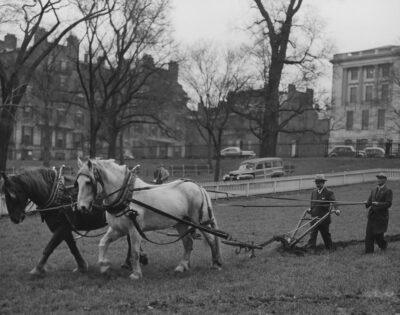War Gardens of World War II And The American Legacy of Food Self-Sufficiency

During World War II, American households answered the government’s call to grow “war gardens,” later known as “victory gardens.” These small, homegrown plots of vegetables became symbols of self-reliance, patriotism, and resilience. War gardens provided essential food supplies during any global conflict and reduced pressure on the nation’s strained agricultural system.
They fostered a sense of community among citizens. Today, the lessons from those war gardens are more relevant than ever, as food security remains a pressing concern in an unpredictable world.
The Role of Heirloom Seeds in War Gardens
Heirloom seeds were crucial to the success of war gardens during World War II. These seeds, passed down through generations, produced robust, flavorful, and nutritious crops. Unlike many hybrid seeds available today, heirloom seeds were open-pollinated, meaning they could be saved and replanted year after year, ensuring a sustainable food source for families. This was particularly important during the war, as commercial seeds were often in short supply and rationing made every resource precious.
Vegetables like tomatoes, beans, cucumbers, and squash, grown from heirloom seeds, became staples in war gardens. These plants were hardy and adaptable, able to thrive in a variety of climates and soil conditions. By growing their own food, families could contribute to the war effort by reducing demand on the commercial food supply, which prioritized feeding troops overseas.
A Modern Call to Action: Why Food Self-Sufficiency Matters Today
In today’s world, food self-sufficiency is as vital as it was during the 1940s. Global supply chains allow supermarkets to stock food from all corners of the world, but these systems are not infallible. Natural disasters, pandemics, geopolitical conflicts, and economic downturns can disrupt the flow of goods, leaving shelves empty and families vulnerable.
The COVID-19 pandemic highlighted the fragility of modern food systems, with shortages of fresh produce and other essentials in many areas. These experiences underscore the importance of having the ability to grow food locally, whether in backyard gardens, community plots, or urban rooftop spaces.
The Benefits of Backyard and Community Gardens
Cultivating a garden, individually or as part of a community, offers numerous benefits. It reduces dependency on external food sources, ensures access to fresh and healthy produce, and saves money in the long run. Additionally, gardening promotes environmental sustainability by reducing the carbon footprint of transporting food long distances.

Rooted in resilience! Just as war gardens sustained our nation in the forties during WWII, today’s heirloom seed community gardens can inspire a new era of food self-sufficiency.
Community gardens also provide opportunities for neighbors to work together, share knowledge, and build stronger social bonds. In an era marked by digital interactions, gardening offers a chance to reconnect with nature and each other.
Planting Your Own Seeds of Resilience
The time to prepare for tomorrow’s uncertainties… is today. Americans can draw inspiration from the war gardens of World War II, using heirloom seeds to grow nutrient-rich vegetables that nourish both body and spirit. Starting a backyard garden doesn’t require much space—containers, raised beds, or even small patches of land can yield a surprisingly bountiful harvest.
Community gardens, too, can serve as modern-day victory gardens, promoting self-sufficiency on a larger scale. Churches, schools, and nonprofits should encourage and support these efforts, providing resources and education to help citizens succeed. In a world of complex challenges, gardening remains a simple yet powerful act. We plant the promise of resilience, independence, and sustainability by planting seeds.
Just as war gardens helped sustain a nation during its time of need, today’s gardens can empower individuals and communities to weather the storms of an uncertain future. Start with heirloom seeds, and let the legacy of those wartime gardeners inspire a new era of food self-sufficiency.
The post War Gardens of World War II And The American Legacy of Food Self-Sufficiency appeared first on Off The Grid News.
Source: https://www.offthegridnews.com/survival-gardening-2/war-gardens-of-world-war-ii-and-the-american-legacy-of-food-self-sufficiency/
Anyone can join.
Anyone can contribute.
Anyone can become informed about their world.
"United We Stand" Click Here To Create Your Personal Citizen Journalist Account Today, Be Sure To Invite Your Friends.
Before It’s News® is a community of individuals who report on what’s going on around them, from all around the world. Anyone can join. Anyone can contribute. Anyone can become informed about their world. "United We Stand" Click Here To Create Your Personal Citizen Journalist Account Today, Be Sure To Invite Your Friends.
LION'S MANE PRODUCT
Try Our Lion’s Mane WHOLE MIND Nootropic Blend 60 Capsules
Mushrooms are having a moment. One fabulous fungus in particular, lion’s mane, may help improve memory, depression and anxiety symptoms. They are also an excellent source of nutrients that show promise as a therapy for dementia, and other neurodegenerative diseases. If you’re living with anxiety or depression, you may be curious about all the therapy options out there — including the natural ones.Our Lion’s Mane WHOLE MIND Nootropic Blend has been formulated to utilize the potency of Lion’s mane but also include the benefits of four other Highly Beneficial Mushrooms. Synergistically, they work together to Build your health through improving cognitive function and immunity regardless of your age. Our Nootropic not only improves your Cognitive Function and Activates your Immune System, but it benefits growth of Essential Gut Flora, further enhancing your Vitality.
Our Formula includes: Lion’s Mane Mushrooms which Increase Brain Power through nerve growth, lessen anxiety, reduce depression, and improve concentration. Its an excellent adaptogen, promotes sleep and improves immunity. Shiitake Mushrooms which Fight cancer cells and infectious disease, boost the immune system, promotes brain function, and serves as a source of B vitamins. Maitake Mushrooms which regulate blood sugar levels of diabetics, reduce hypertension and boosts the immune system. Reishi Mushrooms which Fight inflammation, liver disease, fatigue, tumor growth and cancer. They Improve skin disorders and soothes digestive problems, stomach ulcers and leaky gut syndrome. Chaga Mushrooms which have anti-aging effects, boost immune function, improve stamina and athletic performance, even act as a natural aphrodisiac, fighting diabetes and improving liver function. Try Our Lion’s Mane WHOLE MIND Nootropic Blend 60 Capsules Today. Be 100% Satisfied or Receive a Full Money Back Guarantee. Order Yours Today by Following This Link.






